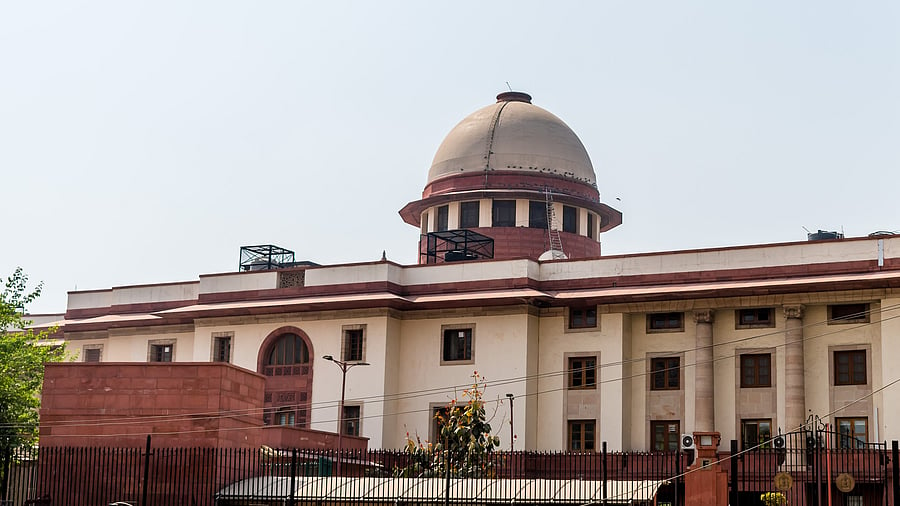
Supreme Court
Credit: iStock Photo
New Delhi: The Supreme Court's Constitution bench on Tuesday decided to examine the presidential reference on fixing timelines for clearing Bills passed by state legislatures from August 19.
A five-judge bench led by Chief Justice of India B R Gavai said the court would initially hear the counsel for Kerala and Tamil Nadu and others on the issue of maintainability.
The court agreed to a suggestion for assigning four days each to the counsels from both the sides for advancing their arguments.
"Initially we will hear the parties on preliminary objection for an hour. After that, we will start hearing Attorney General and Union government, supporting the reference on August 19, 20, 21, 26. The parties opposing the reference to be heard on August 28, September 2, 3, and 9. Rejoinder, if any, would be heard on September 10," the bench said.
The court appointed advocates Aman Mehta and Misha Rohatgi as nodal counsel on behalf of the Centre and the parties opposing the reference respectively.
During the proceedings, senior advocate Kapil Sibal said four days should be assigned to each side for the arguments.
Venugopal submitted, Kerala has filed an application to return the reference unanswered. He urged the court to decide the issue of maintainability. Singhvi, for Tamil Nadu, also asked the court to consider its maintainability.
While fixing the dates of hearing, the bench, also comprising Justices Surya Kant, Vikram Nath, P S Narasimha, and A S Chandurkar, asked the parties to file their written submissions by August 12.
On July 22, the Supreme Court had issued notice to the Centre and all state governments on the presidential reference related to prescribing timelines for Governors and the President to act on Bills passed by the legislative assembly of a state.
Kerala and Tamil Nadu opposed the reference, contending it sought to overrule the April 8, 2025 judgment, which was impermissible.
The reference was made on May 13, 2025 after the April 8, 2025 judgment in the case of Tamil Nadu.
The reference was made by the President in exercise of power under Article 143(1) of the Constitution which allows the top constitutional head to seek the opinion of the Supreme Court on any question of law or fact of public importance.
In the reference, the President sought opinion of the Supreme Court on 14 questions, including whether the exercise of constitutional discretion by the President under Article 201 of the Constitution of India is justiciable.
"Are the decisions of the Governor and the President under Article 200 and Article 201 of the Constitution, respectively, justiciable at a stage anterior into the law coming into force? Is it permissible for the Courts to undertake judicial adjudication over the contents of a Bill, in any manner, before it becomes law," the reference asked.
It also asked if the exercise of constitutional powers and the orders of/by the President / Governor can be substituted in any manner under Article 142 of the Constitution of India.
It also sought opinion if a law made by the State legislature is a law in force without the assent of the Governor granted under Article 200 of the Constitution.
"In view of the proviso to Article 145(3) of the Constitution, is it not mandatory for any bench of this court to first decide as to whether the question involved in the proceedings before it is of such a nature which involves substantial questions of law as to the interpretation of constitution and to refer it to a bench of minimum five judges," it further asked.
The reference also asked if the powers of the Supreme Court under Article 142 of the Constitution are limited to matters of procedural law or Article 142 of the Constitution of India extends to issuing directions/passing orders which are contrary to or inconsistent with existing substantive or procedural provisions of the Constitution or law in force.
"Does the Constitution bar any other jurisdiction of the Supreme Court to resolve disputes between the Union Government and the State Governments except by way of a suit under Article 131 of the Constitution of India," it also asked.
The President felt in prevailing circumstances when the States are frequently approached the Supreme Court invoking Article 32 and 131 of the Constitution, it was expedient to seek the opinion of the apex court on legal questions.
In its April 8, 2025 judgment, a bench of Justice J B Pardiwala and R Mahadevan declared TN Governor R N Ravi's decision to reserve 10 bills for President after those were re-enacted as illegal.
The court had then set the timeline, saying that the President is required to take a decision on the bills reserved for his consideration by the Governor within a period of three months.
